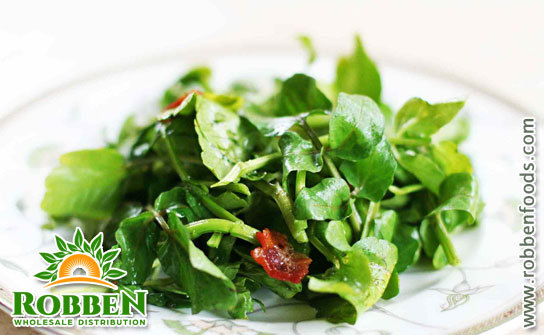 October-27-2023
October-27-2023
View: 2

Watercress makes a delicious addition to any meal and is a nice change from the usual lettuce or spinach.
When it comes to nutritional powerhouses, watercress often stands out as an unsung hero in the world of leafy greens. While it may not receive the same level of attention as kale or spinach, watercress packs a mighty punch in terms of nutrition and health benefits. In this article, we'll delve into the world of watercress, exploring its remarkable attributes and providing you with a delicious salad recipe that showcases this vibrant green.
Watercress: A Nutritional Gem
Watercress, known scientifically as Nasturtium officinale, is a small, leafy plant that thrives in aquatic environments. It is a member of the Brassicaceae family, which includes other nutritional powerhouses like broccoli, Brussels sprouts, and cabbage. Don't let its unassuming appearance fool you; watercress is brimming with essential nutrients.
One of the standout features of watercress is its rich antioxidant content. Antioxidants are compounds that help neutralize harmful free radicals in the body, which can reduce the risk of chronic diseases and slow the aging process. Watercress contains a variety of antioxidants, including carotenoids, flavonoids, and glucosinolates.
Health Benefits of Watercress
The consumption of watercress has been associated with a myriad of health benefits:
1. Heart Health: Watercress's antioxidant-rich profile, particularly the carotenoids, has been linked to a reduction in free radicals within the body. This, in turn, can lower oxidative stress, reduce the risk of cell damage, and protect the heart. Maintaining a diet that includes watercress can be a heart-healthy choice.
2. Cancer Prevention: Watercress contains glucosinolates, which are compounds known for their potential cancer-fighting properties. They can help the body detoxify and eliminate potential carcinogens. Although more research is needed, preliminary studies suggest that watercress may play a role in reducing the risk of certain cancers.
3. Bone Health: This leafy green is also rich in essential minerals such as calcium and magnesium, which are crucial for maintaining strong and healthy bones. Regular consumption of watercress can support bone density and reduce the risk of osteoporosis.
4. Natural Diuretic: Watercress possesses natural diuretic properties that promote the removal of excess water and toxins from the body. This can be particularly helpful for those looking to reduce bloating and promote kidney health.
Watercress Salad Recipe: A Nutrient-Packed Delight
Now that we've explored the remarkable health benefits of watercress, let's dive into a delicious and easy-to-make watercress salad recipe that will allow you to enjoy the full spectrum of its nutritional goodness.
Ingredients:
Instructions:
1. Prepare the Watercress:
2. Assemble the Salad:
3. Add the Feta:
4. Dress the Salad:
5. Season and Toss:
6. Serve and Enjoy:
Watercress, often dubbed the "most nutrient-dense vegetable on the planet," deserves a place on your plate. Its unique blend of antioxidants, minerals, and potential health benefits makes it a valuable addition to any diet. Whether you're looking to support heart health, strengthen your bones, or simply enjoy a delicious salad, watercress has you covered. So, the next time you're seeking a nutritious and flavorful addition to your meal, turn to watercress, the green elixir that can elevate your culinary experience and boost your well-being.
#Watercress #Vegetable #RobbenFoods